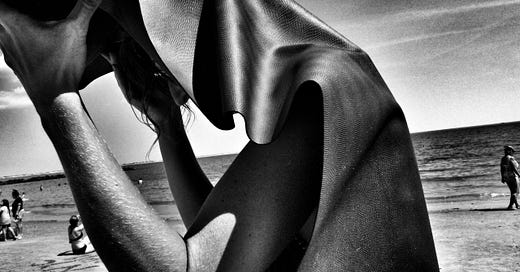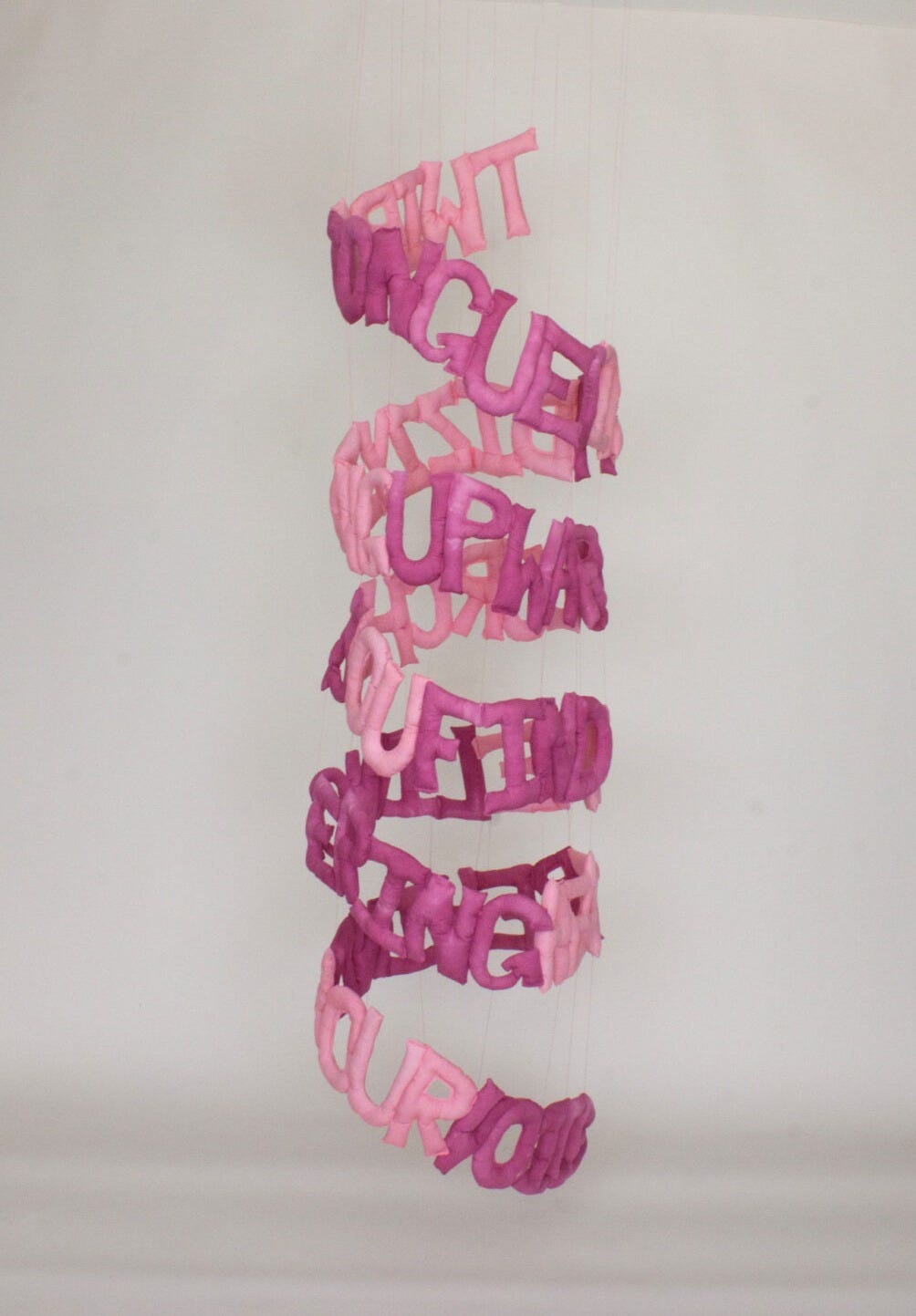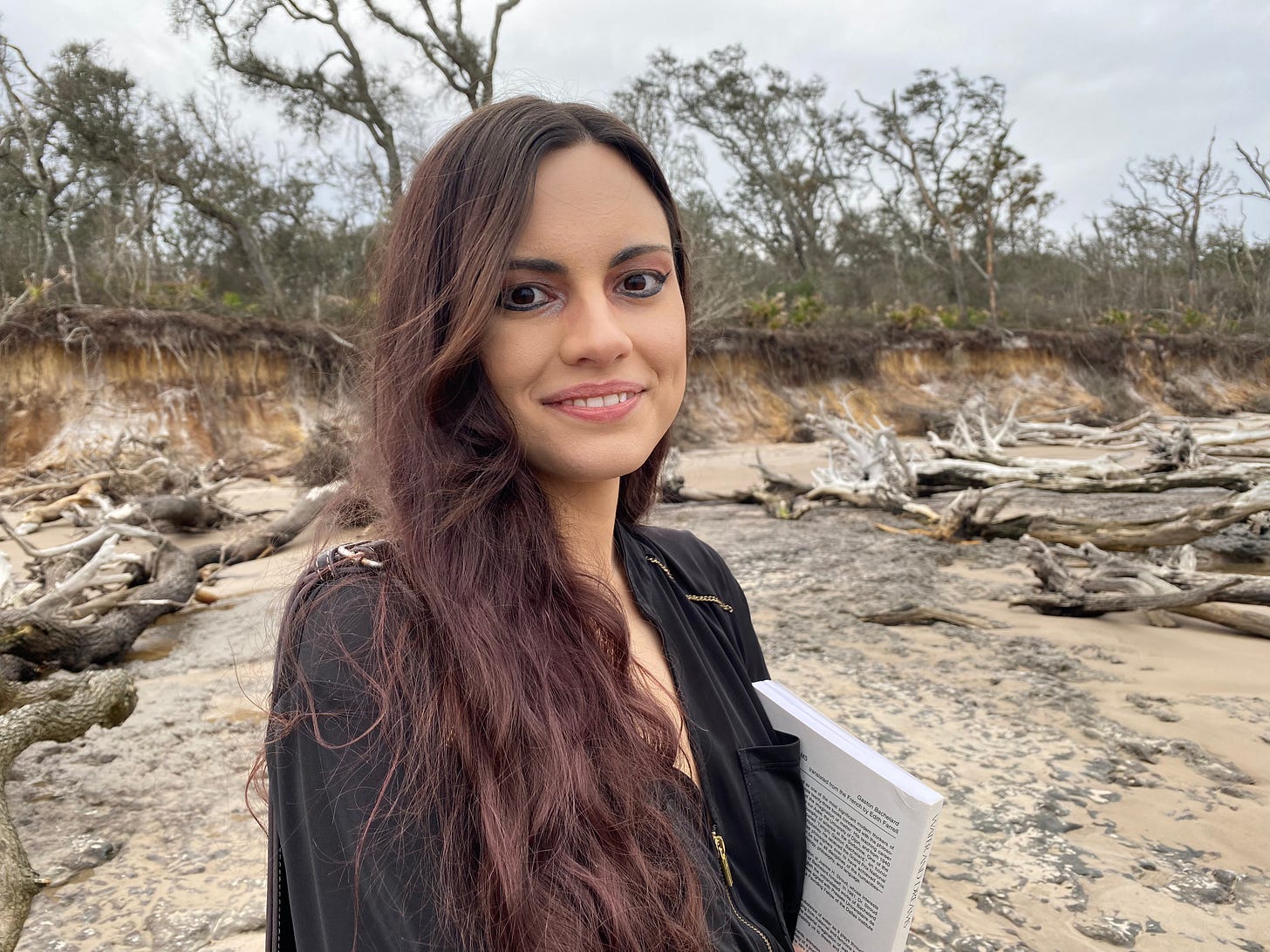Hi friends,
I’m excited to share an interview with Samantha Sharp, who has been involved with Midway Journal since 2022 and now serves as poetry editor. Here is a bit about the publication.
The Midway is a vibrant neighborhood located off I-94 that borders the twin cities of Minneapolis and St. Paul. It’s also the home to the Minnesota state fairgrounds. Alive with a mix of energies and people, The Midway is a place of boundary crossing, reflecting our vision for this journal.
Our goal is that Midway Journal act as a bridge between aesthetics (and coasts), and, like any good fair, that it also creates an engaging sense of place for our readers. The work we publish aims to complicate and question the boundaries of genre, binary, and perspective. It offers surprises and ways of re-seeing, re-thinking, and re-feeling: a veritable banquet of literary fare.
Midway is currently open for submissions, and full guidelines are available here.
Aaron: First, can you tell me a bit about yourself? What is your background as a writer and how did you get interested in writing as a creative pursuit?
Samantha: My path to creative writing has been pretty circuitous and is still taking shape. Since I completed my BA and MA in English and am now in the midst of a PhD in Comparative Literature, my relationship to writing has been primarily academic. My area of focus is poetics, so my interest in creative writing has been more as a critic than a writer.
However, this past year, I started feeling the urge, or perhaps the need, to incorporate more creative practice into my research and my writing. Especially because I study the avant-garde, something just felt inadequate about a traditional analytic mode of scholarship. I’ve been testing out more experimental forms of essay-writing and have also taken up writing poems of my own, which has really shifted the way I approach my academic work. The poetry-writing process allows me to chew on topics in ways I couldn’t, or at least wouldn’t, in an article or an essay.
Aaron: You are poetry editor for Midway Journal. How did you get involved with Midway?
Samantha: I was a fan of Midway long before I joined the masthead in any capacity, so I guess you can say I got involved as a reader! I loved the concept of the Midway as a specific locality [near Minneapolis and St. Paul, MN] that in its very situatedness also gestures outward and becomes a meeting place, a field of interaction. As a grad student with limited funds and way too many books, I also really appreciate online, open-access journals like Midway. I wanted to gain some firsthand experience in the digital publishing world, so I thought Midway would be an ideal place to start.
I first joined the crew as Assistant Poetry Editor in 2022 and loved it, so when we had to say goodbye to our previous Poetry Editor about a year later, I was glad to step into her role. That’s what I’ve been doing ever since!
Aaron: Can you say a bit about the review process at Midway? Specifically, what are a few pieces of insight that would be helpful to a submitter on the other side of things?
Samantha: I can speak more to the process for poetry more than other genres, of course, but I think my advice is generally true for Midway as a whole. First off, we have two basic reading periods: open (January through June) and tip-jar (year-round). For all genres, we have both editors and readers. For poetry, I personally read and vote on poems and assign one additional poetry reader to vote as well, as I prefer to have multiple sets of eyes on every piece.
The review process is holistic in that we do not have set criteria we look for, but rather evaluate each piece on its own terms. While it’s hard to give concrete advice as to style, I can say that Midway welcomes formal experimentation in all genres. For poetry, I tend toward pieces that are less prosaic and more image-driven, whether those images be tactile, sonic, olfactory, or any other sensorial quality. I also encourage poetry that is politically aware and engaged, as art can, and should, help us not only reflect on but also reimagine the dominant social and economic systems.
Again, though, it’s hard to generalize about what type of work we accept! We love to be surprised, and we recently started offering editing services as well, for anyone seeking individualized feedback from us.
Aaron: Here is part of Midway Journal’s mission statement:
“Our goal is that Midway Journal acts as a bridge between aesthetics (and coasts), and, like any good fair, that it also creates an engaging sense of place for our readers. The work we publish aims to complicate and question the boundaries of genre, binary, and perspective. It offers surprises and ways of re-seeing, re-thinking, and re-feeling: a veritable banquet of literary fare.”
From your perspective, how does Midway “bridge” boundaries, whether they are literal boundaries of geographic location, aesthetic boundaries of genre, and/or more figurative boundaries of thoughts and feelings?
Samantha: I like to think Midway bridges geographic, aesthetic, and figurative boundaries simultaneously. It is so exciting that we get submissions from all across the US, and I love stitching together divergent place-based experiences in a single issue, especially when those geographies intersect with differential experiences of class, dis/ability, gender, and race. We also get way more international submissions than I expected when I first joined the journal, which is really important to me as someone working in the field of Comparative Literature. For me, these crossings of geographic boundaries seem to overlap with transgressions of aesthetic and figurative boundaries, as the hybrid geographies we create wind up bringing together a variety of styles and perspectives as well.
The other “bridge” that comes to mind with Midway is one between emerging and seasoned writers; we aren’t the only journal who does a great job of this, of course, but I am really proud that at Midway we consistently bring together writers from all stages of their careers.
Aaron: I’m curious to know how you see the ability of a niche subculture like poetry, and the content of literary publications more generally, to reach people. In your experiences at Midway or otherwise, have you seen an example of poetry connecting with a person or larger audience who don’t typically access it?
Samantha: I’ll admit that I’m typically skeptical about poetry reaching the masses in the same ways that other media can today. I don’t think that’s necessarily a drawback, because it seems to me that the people who seek out poetry connect with it deeply, and personally, I’d take depth over breadth. If Midway can foster those kinds of connections, then I’m satisfied.
At the same time, I have been so inspired by and optimistic about the traction poetry is gaining in the political sphere lately. Palestinian author Mosab Abu Toha is one clear example of a contemporary poet who has been able to reach audiences that may never have been interested in either poetry or Palestinian history in the past, and of the ways in which reading poetry can alter one’s relationship to the world.
Aaron: How would you describe your own aesthetic preferences as a reader of poetry? Are there certain styles or genres that are particularly appealing to you?
Samantha: Well, I study the historical avant-garde, so my mind immediately goes to all of the various -isms of the 20th century. What I like about the historical avant-garde still holds true for contemporary poetry too, though: I like formal experimentation, and specifically formal experimentation whose aim is to challenge the status quo. I also absolutely love poetry that engages ecological thinking and environmental justice; I believe poetry is well-suited to help re-think the dominant narratives about nature and the nonhuman.
Aaron: Relatedly, who are some of your favorite writers? What have you read recently that stands out?
Samantha: Picking all-time favorites is too hard, so I will stick with who I’ve been reading recently! Right now I am a big fan of American author Oliver Baez Bendorf, Polish author Julia Fiedorczuk, Estonian author Maarja Pärtna, who each write different styles of ecopoetry. Over the winter break, I just finished reading Syncope by Asiya Wadud and Paper-Thin Skin by Aigerim Tazhi, which both imbued highly contemporary language with a strong sense of memory in a way that I found extremely moving, and now I am about to start Bluff by Danez Smith.
Aaron: Do you have a “day job”? If so, what do you do? How do you balance livelihood with the demanding needs of a lit mag along with daily life?
Samantha: I’ve had a few different jobs during my time at Midway, from teaching to tutoring to retail. Though I often feel overwhelmed balancing part-time work with my doctoral studies, I do have a more flexible schedule than if I worked a typical 9-5, so that allows me to read submissions throughout my day whenever I have downtime. Some weeks are busier than others, of course, and I’m lucky to have colleagues at Midway who can be flexible as well!
Aaron: How does social media fit into Midway Journal’s presentation of content? More generally, do you have a comment about the (dis)function or (un)usefulness of social media in the realm of lit mags and creative arts? Social media can be frustrating, but it does have its benefits, of course. I’m curious about how you may have found it helpful as well as to how you have come across any roadblocks to sharing work via social media.
Samantha: Personally, I think social media is a really useful way to share literature. I used to worry that people would only look at the social media posts and not follow up on the works themselves, but eventually I realized that whenever I see a great line from a poem on social media I always go and click the link to the full piece. I’ve discovered so many amazing journals through social media, and I’m sure lots of folks can say the same about Midway. Of course, I don’t personally run the social media page; if I did more of the labor, maybe I’d have some frustrations to share!
Aaron: What is a piece of advice you would pass along to lit mag submitters out there? Maybe a DO and/or a DON’T DO to keep in mind when submitting work?
Samantha: DO: find journals that match your values; submit work you care about; submit work you would want to read; remember that publication is not the only thing that matters.
DON’T: be afraid to revise; take rejections too hard; include an exorbitant number of publications in your bio.
Aaron: Lastly, can you leave us with a writing prompt or exercise that you like? Very open-ended here—anything that our readers can use today in their notebooks.
Samantha: While not exactly a writing prompt, here is a listening exercise I think deeply (no pun intended) benefits one’s writing practice, especially when it comes to poetry. The exercise comes from Pauline Oliveros’s text Deep Listening: A Composer’s Sound Practice and asks you to make a field recording of sounds from your everyday environment. I like this activity because it forces you to pay attention to what is typically in the background, and also raises your awareness of rhythmic and sonic elements that might inform your writing. I have quoted an excerpted version of the instructions from Oliveros’s text below. She suggests recording for about ten minutes, then trimming it down to the three minutes you find most exciting.
A Study in Pulses:
The natural and urban environments are full of pulses and patterns. Try to record the most interesting pulses or patterns that you can find in your daily environment. Pulses are repeating sounds. They may be extremely rapid to extremely slow. The pulse may be natural, mechanical or electrical. When you listen to the environment that you want to record, listen both with and without headphones until you feel that you are capturing the sounds as realistically as possible.
—Pauline Oliveros
Samantha Sharp is a PhD candidate in the Department of Comparative Literature at SUNY Binghamton, where she studies ecopoetics and political ecology. She serves as Poetry Editor for Midway Journal, and her poetry has been published or is forthcoming in Wild Roof Journal, Dipity Lit Mag, and Up the Staircase Quarterly. She is currently living in Yerevan, Armenia, but permanently resides in upstate New York with her two cats.
Subscribe to see more guest posts from WRJ’s amazing contributors / Paid access includes opportunities for editorial feedback and free submissions for upcoming issues.








"because it seems to me that the people who seek out poetry connect with it deeply, and personally, I’d take depth over breadth. If Midway can foster those kinds of connections, then I’m satisfied."
YES.
"At the same time, I have been so inspired by and optimistic about the traction poetry is gaining in the political sphere lately. Palestinian author Mosab Abu Toha is one clear example of a contemporary poet who has been able to reach audiences that may never have been interested in either poetry or Palestinian history in the past, and of the ways in which reading poetry can alter one’s relationship to the world."
This is a fascinating thing and I love to know that it is happening. I don't tend to write with any political motive myself - wait, that's a lie, I don't submit poetry that is motivated by that because I haven't found a way to hold the tension between the world and myself correctly - but I love the golden moments when I see poetry become part of the thread that holds the globe together, affecting the internal world with resounding ramifications... it is beautiful & very healing somehow.